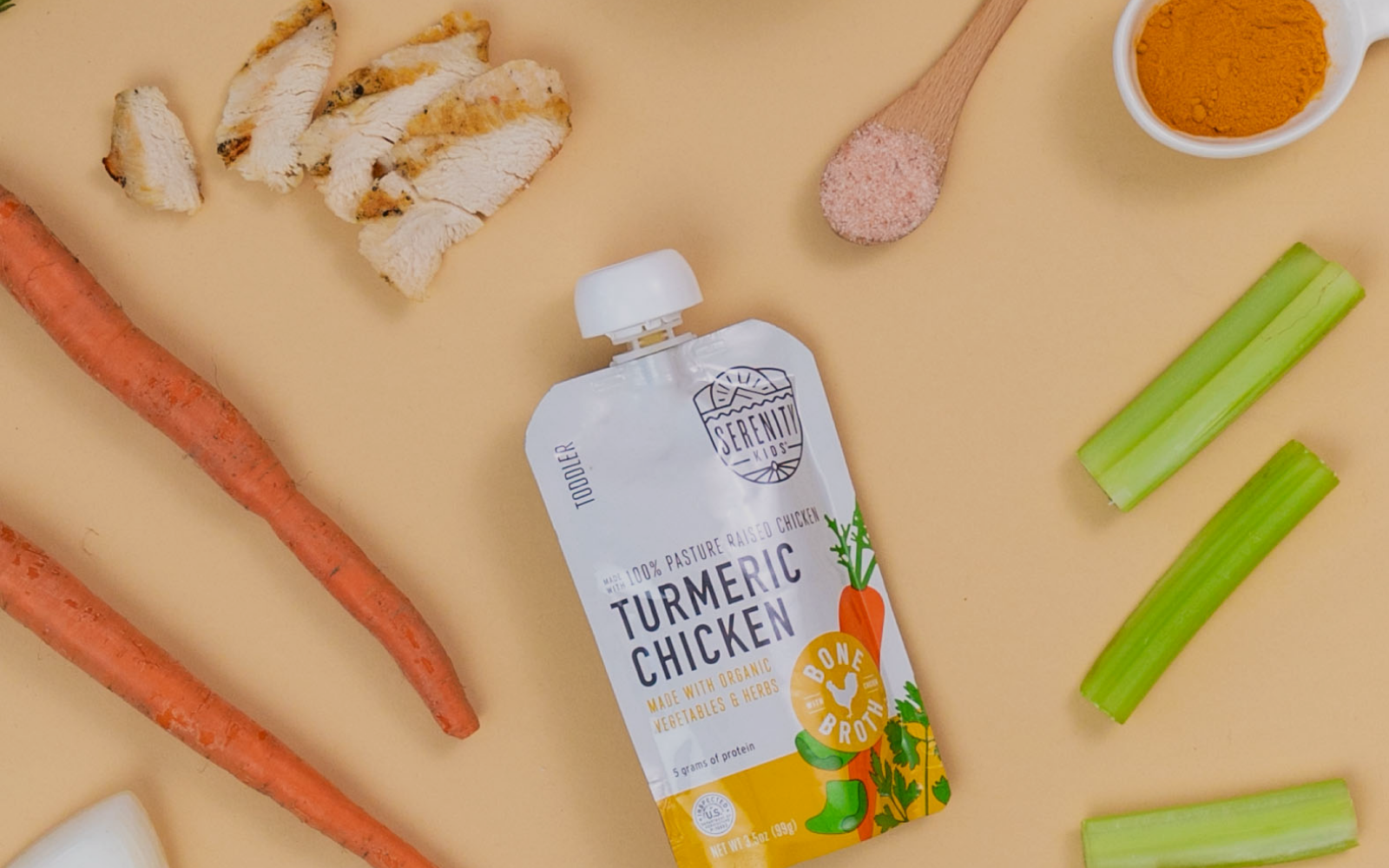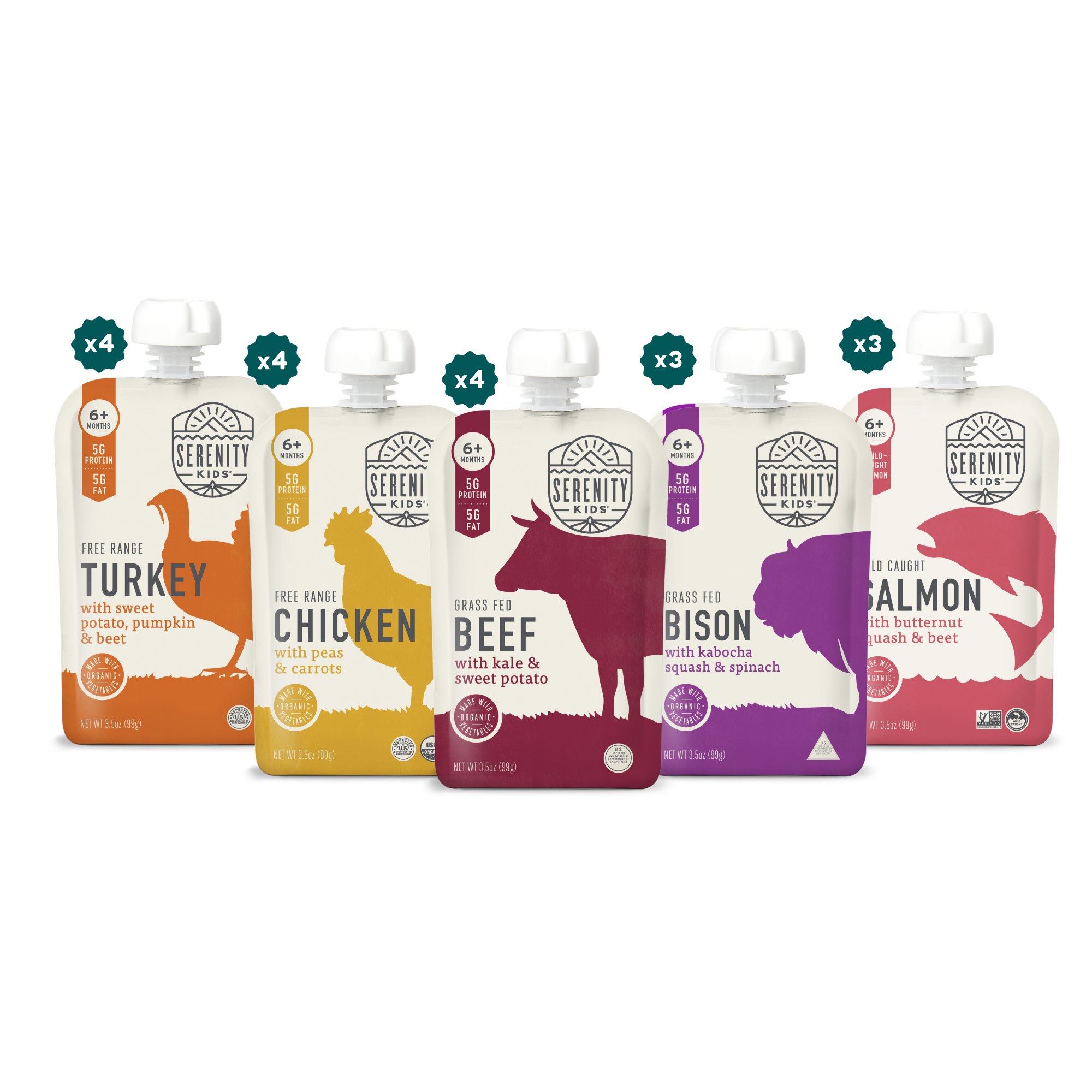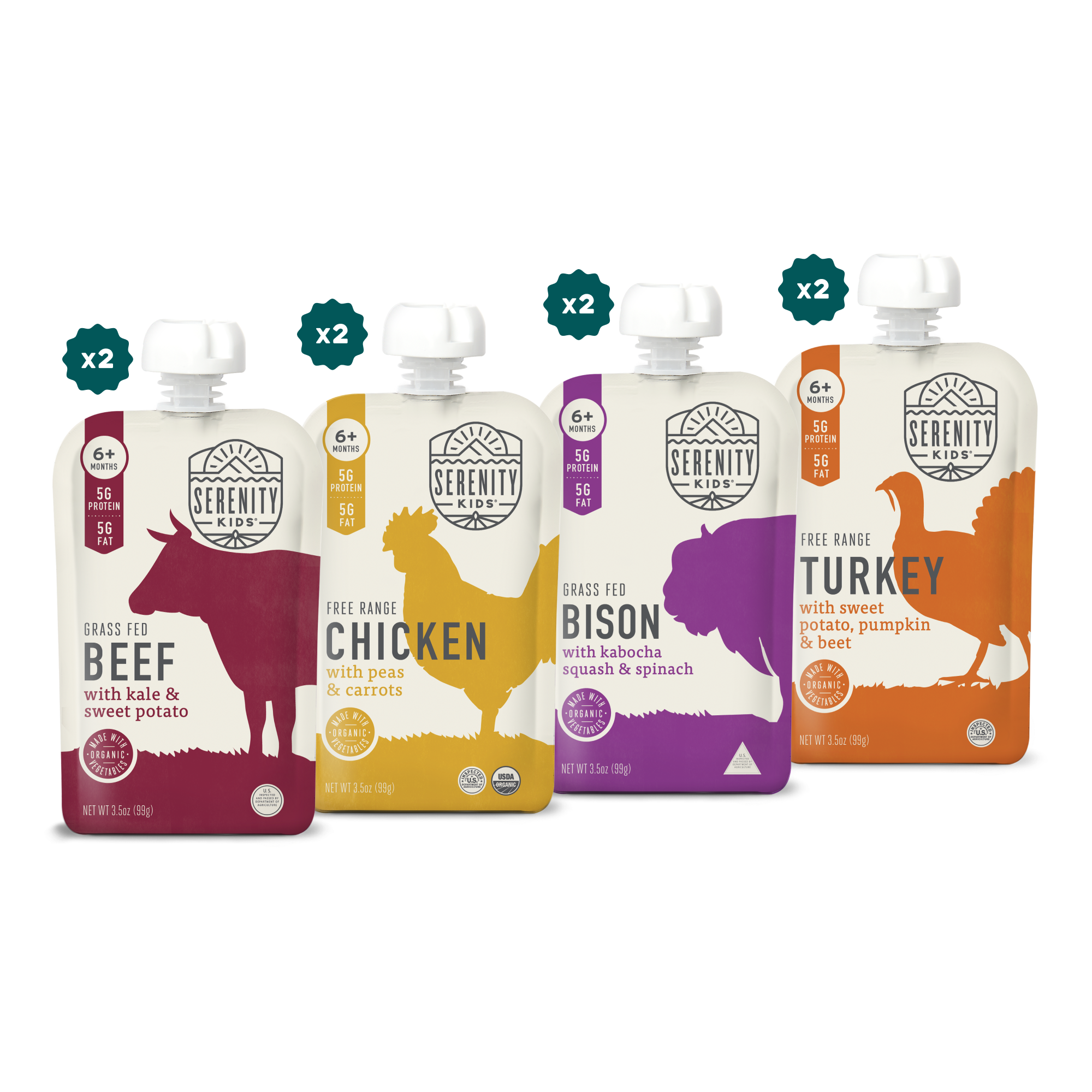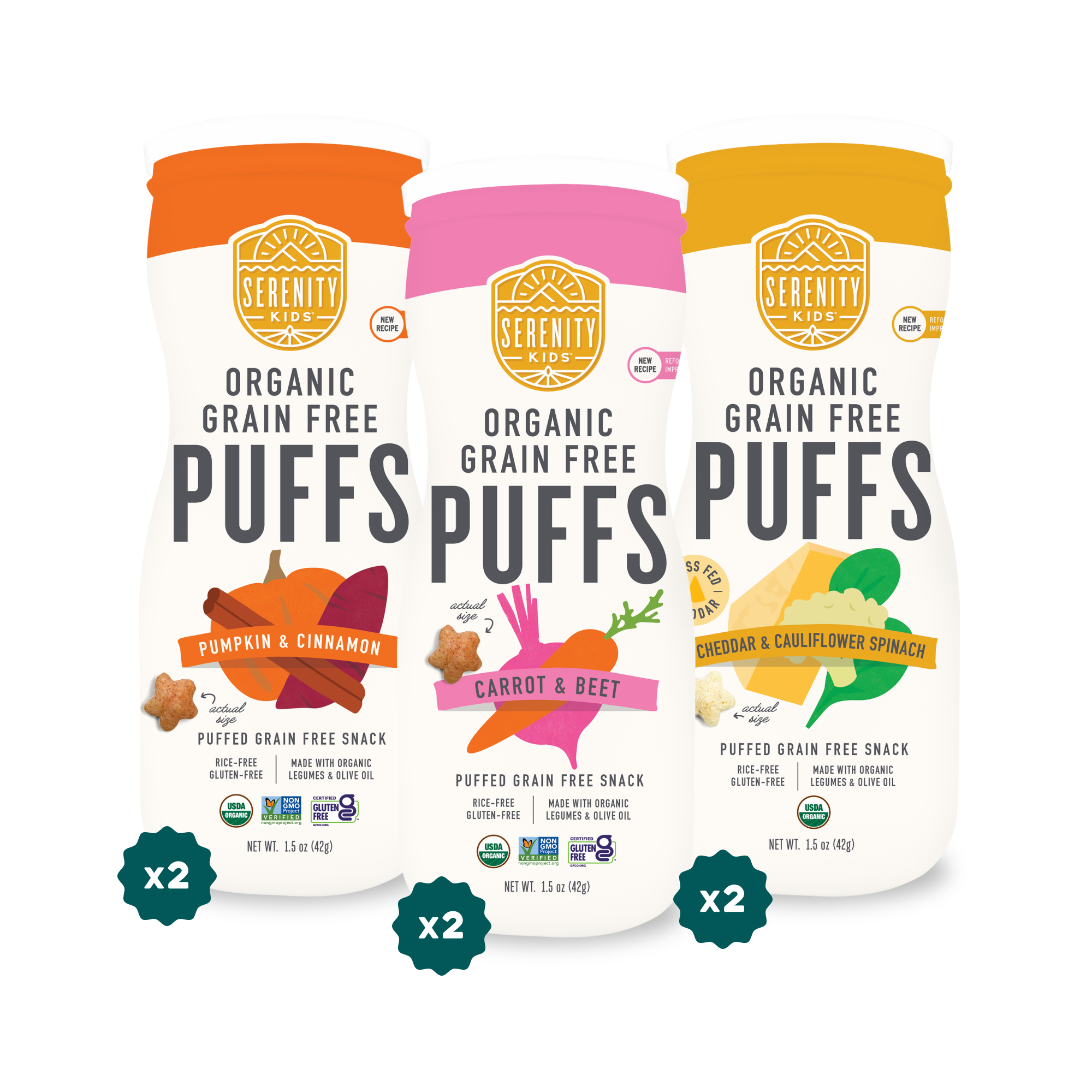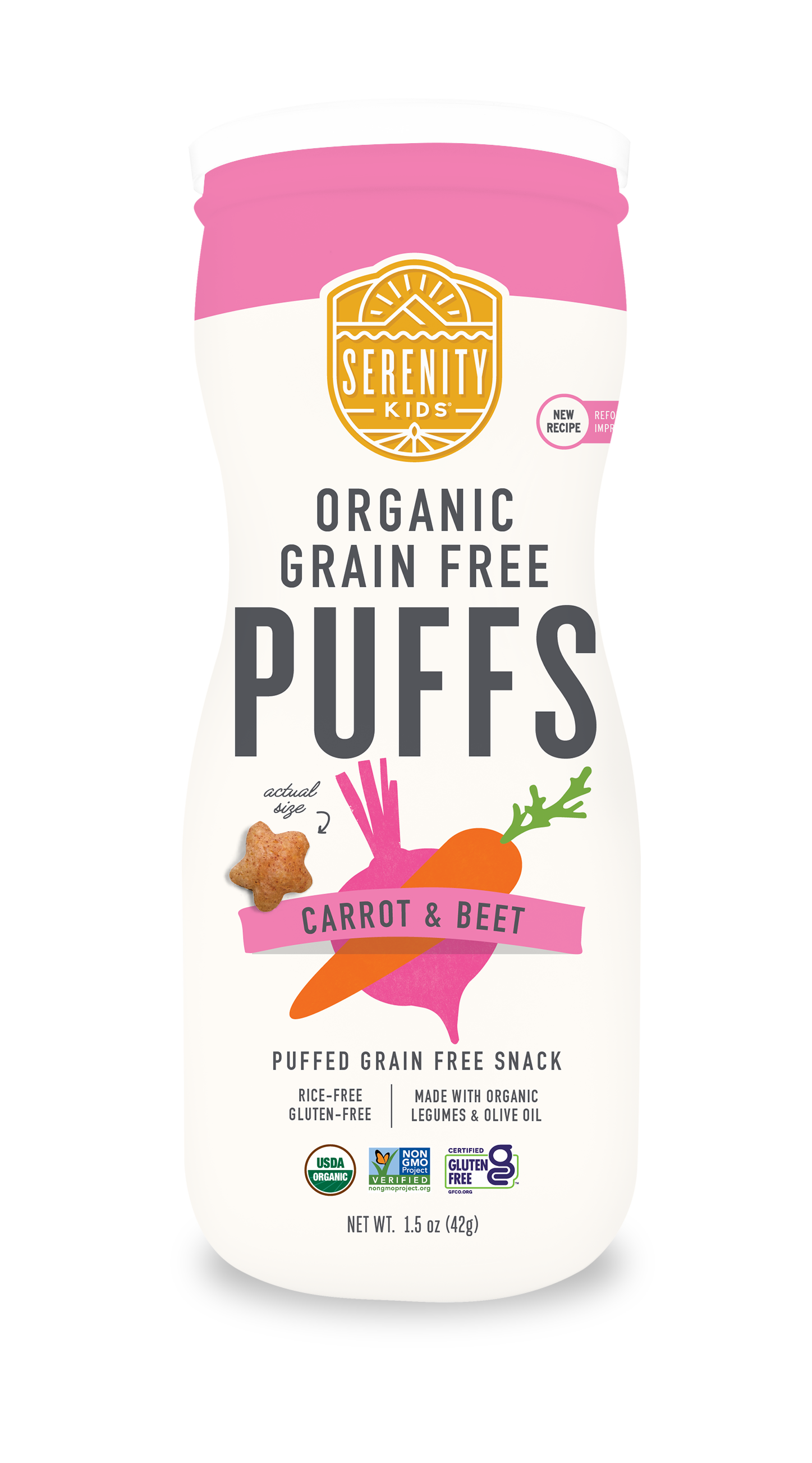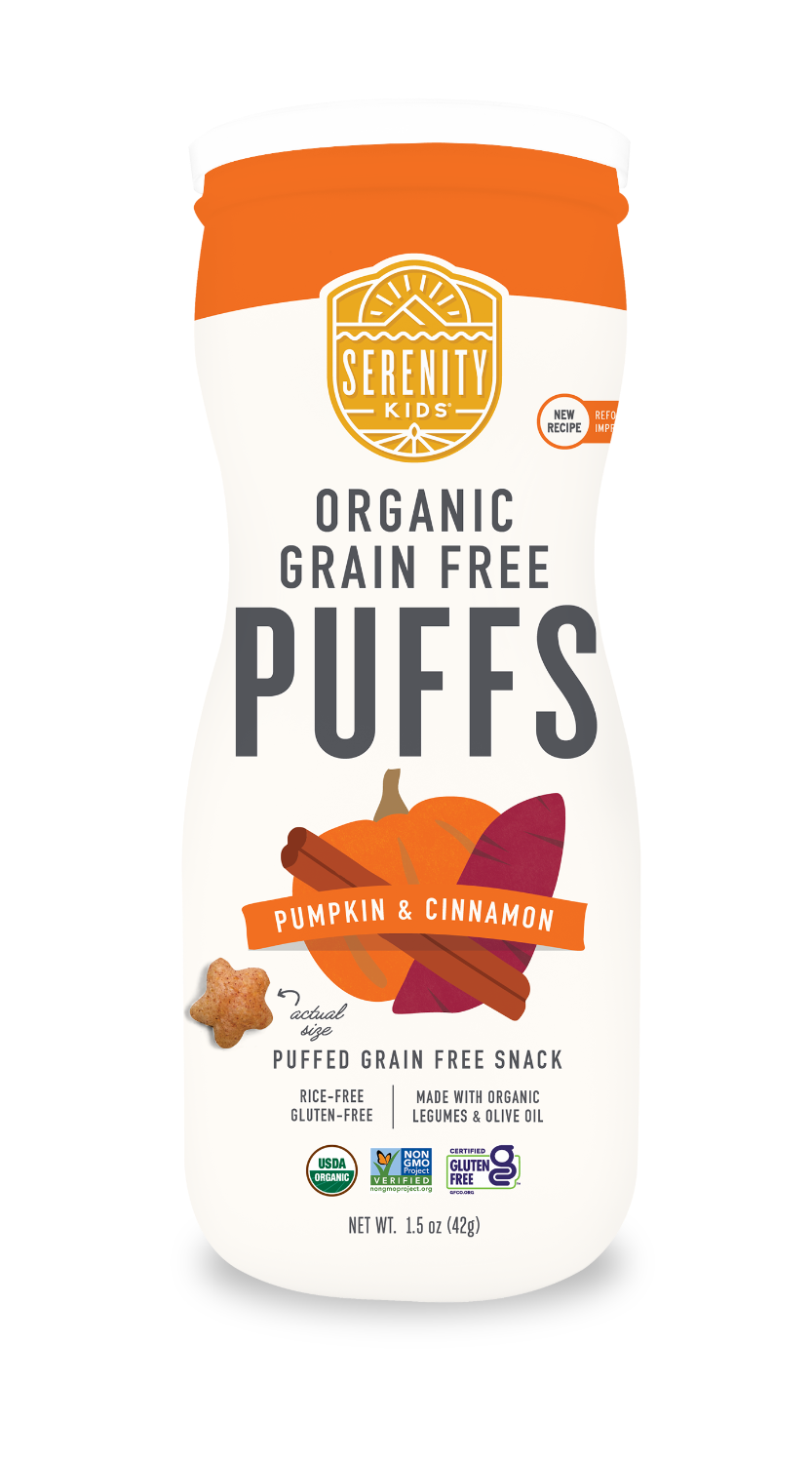Yes, babies can have turmeric in small, safe amounts—it’s a gentle spice with potential benefits. That’s why we thoughtfully include it and other wholesome ingredients in our recipes. Healthy, nourishing foods play an important role in children’s development, which is why Serenity Kids sources nutrient-dense ingredients from farms who practice regenerative agriculture. Our mission to make farm-to-high chair baby food that is savory, low-sugar (our products contain no added sugars or sugary fruits), full of protein and healthy fats, and that tastes savory and delicious.
As parents, we spend a lot of time thinking about what we are feeding our children and where that food comes from. Finding baby food that is free of any harmful chemicals or hormones, while not skipping out on essential nutrients shouldn’t be as hard as it is. When our founders, Serenity & Joe, were searching for low-sugar, savory baby food full of nourishing whole food ingredients, they couldn’t find any, so that’s when Serenity Kids was born.
Our mission is to make children healthier by offering nutrient-dense foods that taste great to kids and are convenient for parents. Serenity Kids provides food for babies and toddlers that has the right balance of protein, healthy fats, and whole-food carbohydrates, while not skimping out on the nutrients they need to thrive. Our pouches and grain-free puffs are packed full of essential nutrients, antioxidants, vitamins, and minerals to aid in a baby’s growth and development.
Serenity Kids baby food and toddler snacks do not have any harmful chemicals, hormones, pesticides, or artificial additives. Our farms practice regenerative agriculture techniques, which improve the land and reverse climate change.
What’s in Our Food?
Ingredients are important to us, which is why we’ve made our baby & toddler purees with better than just organic ingredients that help your baby get the nutrients they need to thrive.
Meet the ingredients in our Clean Label Purity Award-winning Turmeric Chicken with Bone Broth recipe:
- Organic Carrots
- Free range chicken bone broth (water, Organic chicken bones, Organic carrots, and Organic parsley)
- Pasture raised chicken
- Organic Celery
- Organic Olive Oil
- Organic Turmeric
- Organic Ginger
- Organic Onion
- Organic Parsley
- Himalayan Sea Salt
Why Bone Broth?
Bone broth is a protein-rich liquid made from simmering animal bones and meaty joints with water, vegetables, herbs, and spices. Simmering helps release the minerals and nutrients from the animal bones, which makes a delicious, nutrient-rich broth. It distinguishes itself from stock due to its lengthy cooking time and enhanced nutrition. Bone broth can be used as a base for soups, stews and to cook meats and steam veggies (Good Food, 2021), or in our case, our Bone Broth Pouches.
Bone broth is rich in minerals and healthy nutrients, including vitamins and amino acids (Healthline, 2021). It has been known to benefit the digestive system, fight inflammation, improve joint health, improve sleep, and support brain function (Healthline, 2021).
Think about all the times your grandparents told you to have a bowl of soup when you were not feeling well. This idea stemmed from the notion that getting to eat the whole animal from nose-to-tail allows you to get the most nutrition out of your meal. And in reality, they were right!
Bone broth is high in protein and is easily digestible. This makes it great for kids with digestion problems and a great first food option for your baby!
What Makes Bone Broth So Beneficial for Babies?
Bone broth blended with a tiny bit of pureed liver is a great first food for your baby. The thin consistency makes it easy for babies to drink through a bottle, while getting all the nutrients. It is also a great way to add nutrition when thinning out your homemade purees (this is how we thin out our bone broth pouches rather than using water!).
Learn how to make Serenity's nutrient-rich recipe for liver bone broth or chicken bone broth; we promise, it's way more simple than you may think!
Bone broth is also an accessible source of protein for babies and young toddlers (the older the baby gets, the more protein they need). Furthermore, the minerals in bone broth help build bones, a critical need, as your baby's spine doubles in size within the first 12 months of life. Learn more about why bone broth is great for little ones here.
Depending on which kind of bones you use (chicken, turkey, beef, etc.) the exact nutrient content will vary. In general, bone broth is rich in the following nutrients…
Calcium
Calcium is one of the most important nutrients for babies to receive, which is a mineral that aids in bone strength and development, nerve health, muscle growth, and even heart health.
It’s important for children to get enough calcium on a daily basis because by the time a child reaches age 17, almost 90% of their adult bone mass will already have been established (Child Life Essentials).
“According to statistics from the U.S. Department of Agriculture, 86% of teenage girls and 64% of teenage boys are ‘calcium deficient;’ children who don’t get enough calcium are more likely to suffer from bone fractures and may develop osteoporosis as they age & risk having weaker teeth and tooth decay later in life,” says Child Life Essentials.
Our Turmeric Chicken Pouches are dairy-free, so they are easily digested, allergen-friendly, and perfect for all kiddos, but especially those with a sensitivity to dairy or who are lactose intolerant.
Magnesium
Magnesium aids in tons of a baby’s everyday processes such as their sleep, mood, energy, focus, breathing, bones and teeth, digestion, heart health, hormones, and blood sugar levels. We notice that a drop in magnesium levels can cause babies to become cranky, have irregularly poor sleep, or have a drop in their energy.
It’s recommended that children from one to three years old get 80 milligrams of magnesium per day. Although magnesium is important for your body, taking it through certain supplement forms (like magnesium citrate can lead to loose stools. For this reason, it is best to get your magnesium intake from whole foods like bone broth. The magnesium in the bone broth is not only natural, but is far easier processed by your body to make sure that digestion occurs properly.
Iron
Iron is important for a baby’s development -- the Centers for Disease Control (CDC) recommends babies six months and older get most of their iron through iron-rich foods. Our Turmeric Chicken pouches are a great source of iron for a toddler. Just like copper, iron aids with the formation of hemoglobin, which helps with cellular respiration and metabolism; iron helps your baby’s red blood cells remain healthy.
Although iron is very important for a baby’s development, people tend to not know that there are different types of it. Heme-Iron is only found in animal proteins which makes eating poultry and seafood vital to getting enough in your system. This type of iron is more easily digestible than non-heme iron which is found in plant-based foods.
When looking at different baby food products, it is important to make sure that the iron in the food is not synthetic. Synthetic iron is difficult for the body to digest and break down and can lead to abdominal discomfort and constipation. Synthetic iron is commonly added to baby foods and cereals as it is well known as an important nutrient for this stage.
Zinc
Zinc aids in a baby’s overall development. Their reproductive organs, immune systems, and even their brains benefit from zinc. It’s recommended to achieve proper zinc intake through a balanced diet and nutritious foods.
The most common way to get zinc in your diet is through eating meat. This is especially important for babies considering that bone broth is already a major source of many other nutrients that they need for healthy development and growth.
Amino Acids
Amino acids are the building blocks of proteins. In other words, they are what fuel your baby’s growth, movement, energy, productivity, healthy height and weight, and much more, and Turmeric Chicken Pouches are full of easily digestible amino acids.
We pack our pouches full of ingredients high in vitamins and minerals essential to a baby’s growth and development, and our purees with bone broth provide an extra nutrient boost from whole food ingredients.
Summary
We know there are many options when it comes to feeding solids to your little ones, which is why we work hard to ensure our pouch purees are made in chemical-free packaging, are full of organic ingredients, are low in sugar (with no added sugars or sugary fruits!), are full of nutrients essential to growth and development like protein and health fats, and taste savory and yummy!
Our Turmeric Chicken with Bone Broth Pouches are a great way to give your baby balanced meals while providing them with the vitamins and minerals they need to thrive -- like calcium, magnesium, phosphorus, zinc, and more.
To explore other nutrient-dense bone broth flavors from Serenity Kids, click here! We also feature bone broth in a couple of our puff recipes, which you can find here.
Here's what other parents are reading right now...
- What is the pincer grasp and when do babies develop it?
- Best gifts for second baby/baby sprinkle gift ideas
- The truth about heavy metals in baby food
- The best supplements for cold and flu season
Sources:
- Calcium (for Parents) - Nemours KidsHealth
- Dietary Reference Intakes for Calcium, Phosphorus, Magnesium, Vitamin D, and Fluoride - National Academies of Science, Engineering, and Medicine
- Magnesium in your child's diet - Baby Center
- Copper in your pregnancy diet - Baby Center
- Iron | Breastfeeding - CDC
- Iron needs of babies and children - NIH
- Phosphorus in your pregnancy diet - Baby Center
- Zinc Helps Kids Grow - WebMD
- Importance of Proteins and Amino Acids in Child Growth - Nestle Nutrition Institute
- Pesticides, Herbicides and Children - American Academy of Pediatrics
- What is Regenerative Agriculture? - Regeneration International
- Bone Broth: How to make it and why you should
- How to make bone broth on the stove or a slow cooker
- The importance of calcium in childhood
- The health benefits of bone broth
*Note that bone broth is high histamine and may not be recommended for those with histamine intolerance. Histamine intolerance may present as eczema, sinus congestion, or digestive distress. As with any new recipe or flavor introduction to your little one, consult with a healthcare professional. All content within this site is not intended as medical diagnosis or treatment and should not be considered a substitute for, nor does it replace professional medical advice, diagnosis, or treatment. If you have any concerns or questions, you should always consult with a physician or other healthcare professional.















